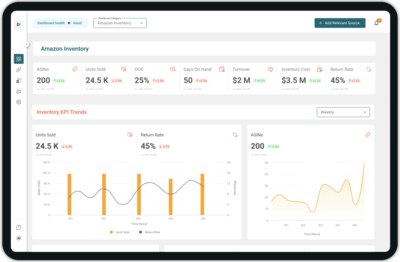Magento 2 is the most used CMS (Content Management System) to create online stores around well known for its powerful and scalable architecture. If you’re reading this, there’s a good chance you’re already familiar with Magento 2 and looking to sync your data to a scalable data warehouse for easy accessibility and analysis. Replicate Magento 2 data to BigQuery and optimize your operations by combining Magento 2 data with marketing, analytics, engagement, and customer support data to estimate your true end-to-end performance and ROI.
Why integrate Magento 2 to BigQuery
Magento 2 is used by small and large operations all around the world for a wide variety of projects due to its rich features and extensible codebase. Many tools keep your data in silos, show you aggregated metrics, and keep you from doing more advanced analysis. Integrating your Magento 2 data to BigQuery will help you to store this data at a single location or warehouse for easy access and seamless analysis. When you back up your Magento 2 data to Google BigQuery you can even combine this data with other data sources used by your business to make it even more valuable.
Magento 2 Overview
Magento is the leading eCommerce platform used for online stores. It is a high-performed, scalable solution with powerful out-of-the-box functionality and a large community built around it that continues to add new features. Magento 2 was released in 2015 and is a re-envisioning of the platform bringing it up to date with the latest development practices as a foundation for future features and growth. Magento 2 provides many exclusive features that ensure optimal marketing and analytical techniques, as well as improving your administrative options – all of which benefit the customer’s shopping experience.
BigQuery Overview
Google BigQuery is a cloud-based data warehouse service introduced by Google. It is a REST-based web service that allows you to run complex analytical SQL-based queries under large sets of data. Additionally, BigQuery is a serverless, highly scalable, and cost-effective multi-cloud data warehouse designed for business agility. Its fast deployment cycle and on-demand pricing make it one of the highly accessible and popular data warehouses.
How to replicate Magento 2 to BigQuery
Here’s an overview of the two approaches you can use to replicate Magento 2 data to BigQuery. This will allow you to evaluate the pros and cons of both and choose the one that best suits your requirement.
Build your own data pipeline
This process needs a lot of experience and consumes a lot of time and manpower. The chances of errors are more due to multiple integrated steps to be executed one after the other. You need to extract data using Magento 2 APIs & then connect it properly with the BigQuery data warehouse. This whole process to build a custom data pipeline requires regular intervention that makes it cumbersome.
Use Daton to integrate Magento 2 and BigQuery
Integrating Magento 2 and BigQuery with Daton is the fastest & easiest way to save your time and efforts. Leveraging a cloud data pipeline like Daton significantly simplifies and accelerates the time it takes to build automated reporting.
Configuring data replication on Daton only takes a few minutes and a few clicks. Your analysts do not have to write any code or manage any infrastructure, yet you can get access to Magento 2 data in a few hours.
Daton’s simple and easy-to-use interface allows analysts and developers to use UI elements to configure data replication from Magento 2 data into BigQuery.
Daton takes care of:
- Authentication
- Rate limits
- Sampling
- Historical data load
- Incremental data load
- Table creation, deletion, and reloads
- Refreshing access tokens
- Notifications
and many more important functions to enable data analysts to focus on analysis rather than worrying about the data transfer.
Steps to integrate Magento 2 with Daton

- Sign in to Daton
- Select Magento 2from the integrations page
- Provide Integration Name, Replication Frequency, and History. Integration name would be used in creating tables for the integration and cannot be changed later
- You will be redirected to Magento 2 login for authorizing Daton to extract data periodically
- Post successful authentication, you will get prompts to choose from the list of available Magento 2 accounts
- Select required tables from the available list of tables
- Then select all required fields for each table
- Submit the integration
Sign up for a trial of Daton today!
Here are more reasons to explore Daton for Magento 2 to BigQuery Integration
- Faster integration – Magento 2 to BigQuery is one of the integrations Daton can handle very conveniently and seamlessly. By following few steps you can easily connect Magento 2 to BigQuery.
- Low Effort & Zero Maintenance – Daton automatically takes care of all the data replication processes and infrastructure once you sign up for a Daton account and configure the data sources. No need to manage infrastructure or write manual code.
- Data consistency guarantee and an incredibly friendly customer support team ensure you can leave the data engineering to Daton and focus on analysis and insights!
- Enterprise-grade data pipeline at an unbeatable price to help every business become data-driven. Get started with a single integration today for just $10 and scale up as your data needs grow.
- Robust Scheduling Options: This allows you to schedule jobs based on their requirements using a simple configuration step.
- Support for all major cloud data warehouses including Google BigQuery, Snowflake, Amazon Redshift, Oracle Autonomous Data Warehouse, PostgreSQL, and more.
- Flexible loading options allow to you optimize data loading behavior to maximize storage utilization and ease of querying.
- Enterprise-grade encryption gives your peace of mind
- Support for 100+ data sources – In addition to Magento 2, Daton can extract data from a varied range of sources such as Sales and Marketing applications, Databases, Analytics platforms, Payment platforms, and much more.
And that’s it! Daton will take care of all the heavy-weight lifting to ensure that the data replication from Magento 2 to your BigQuery data warehouse happens in a near real-time and hassle-free manner.
Other Articles by Saras Analytics,
- Business Intelligence vs Data Analytics
- ACoS
- Calculate Customer Lifetime Value (CLTV)
- Amazon Attribution
- BI Services and Data Warehousing
- What is Magento 2?Magento 2 is a content management system used for creating online stores with a powerful and scalable architecture. It is highly extensible, providing a range of features that ensure optimal marketing and analytical techniques, as well as improving administrative options to enhance the customer’s shopping experience. Magento is the foremost eCommerce platform used for online stores. It is a high-performance, scalable solution with strong out-of-the-box functionality and a large community developed around it that keeps on enhancing new features. Magento 2 was released in 2015 and is a re-envisioning of the platform turning into state-of-the-art with the most recent improvement practices as a basis for future features and development.
- What is BigQuery?BigQuery is a cloud-based data warehouse service provided by Google that allows you to run complex analytical SQL-based queries under large sets of data. It is highly scalable, cost-effective, and designed for business agility. It is a REST-based web service that is serverless and offers on-demand pricing. Its fast deployment cycle and on-demand pricing make it one of the highly accessible and popular data warehouses.
- Why should I integrate Magento 2 with BigQuery?Integrating Magento 2 with BigQuery allows you to store your data in a single location or warehouse for easy access and seamless analysis. When you back up your Magento 2 data to Google BigQuery, you can combine it with other data sources used by your business to make it even more valuable. This will help optimize your operations by combining Magento 2 data with marketing, analytics, engagement, and customer support data to estimate your true end-to-end performance and ROI.
- What are the benefits of using Daton for Magento 2 to BigQuery integration?Daton provides a fast and easy way to integrate Magento 2 with BigQuery. It simplifies and accelerates the time it takes to build automated reporting. It automatically takes care of all data replication processes and infrastructure, making it low effort and zero maintenance. Daton guarantees data consistency and provides a friendly customer support team. It is an enterprise-grade data pipeline at an unbeatable price to help every business become data-driven. Daton supports all major cloud data warehouses, including Google BigQuery, Snowflake, Amazon Redshift, Oracle Autonomous Data Warehouse, PostgreSQL, and more.
- How do I replicate Magento 2 to BigQuery using Daton?Replicating Magento 2 to BigQuery using Daton is easy. You simply sign up for Daton, select Magento 2 from the integrations page, and provide the integration name, replication frequency, and history. You will be redirected to Magento 2 login for authorizing Daton to extract data periodically. Post successful authentication, you will get prompts to choose from the list of available Magento 2 accounts. Then you select the required tables from the available list of tables, select all required fields for each table, and submit the integration.














